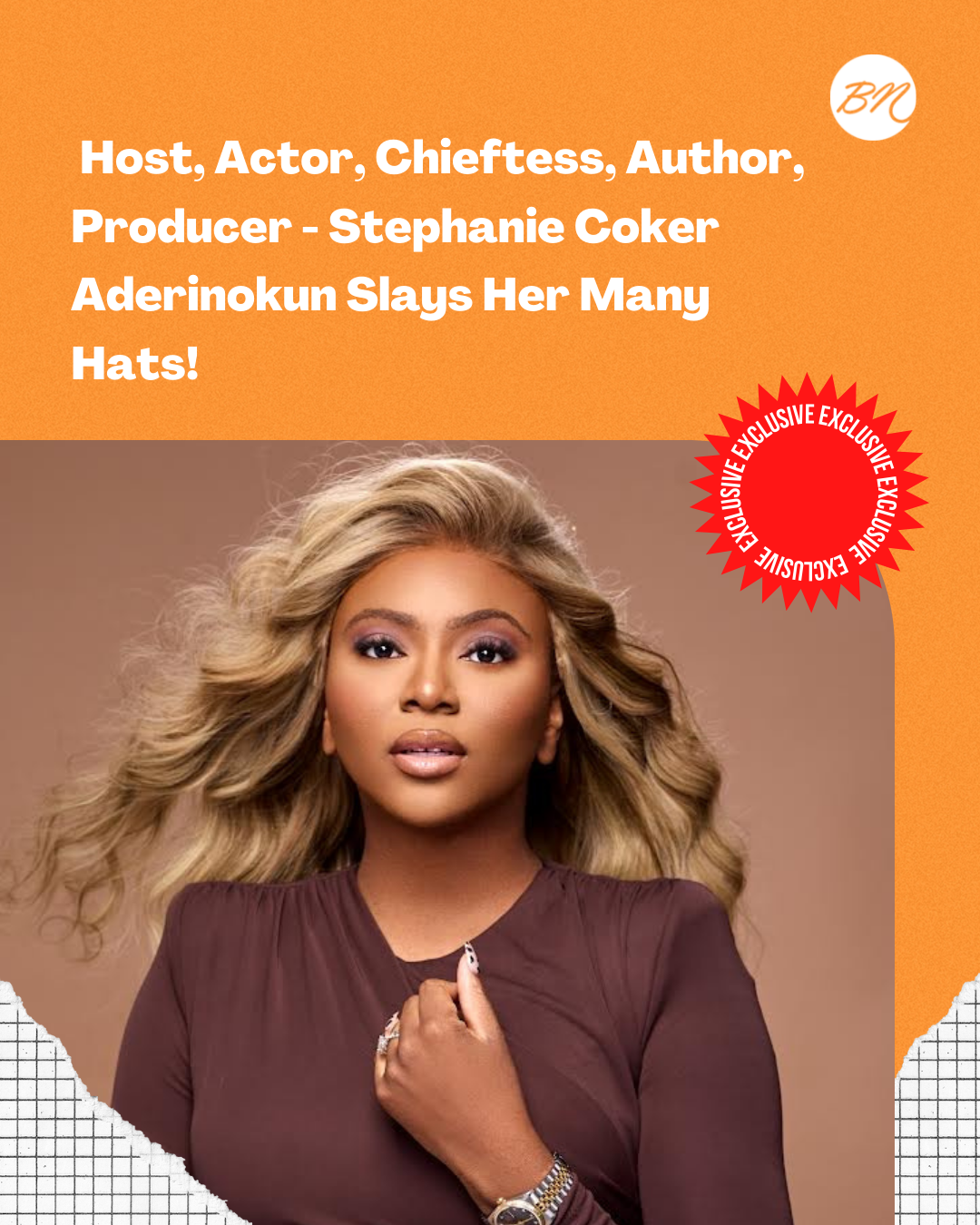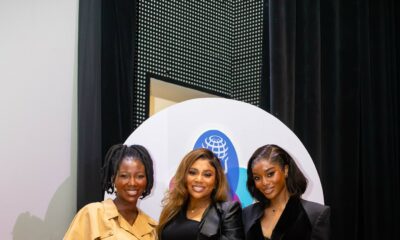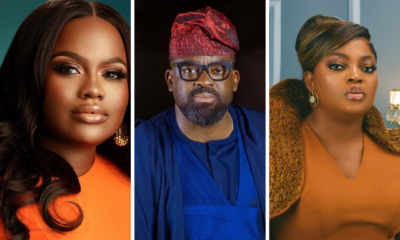Career
Host, Actor, Chieftess, Author, Producer – Stephanie Coker Aderinokun Slays Her Many Hats!

Stephanie Coker Aderinokun needs no introduction as you must have heard her name or seen her on your screens. If not from hosting MTV Base shows or “The Voice Nigeria,” then in some of the most successful Nollywood movies including “King Of Boys,” “Fate Of Alakada,” or most recently, on one of the most popular podcasts making waves at the moment, “Me, Her & Everything Else,” where she has hosted the likes of BamBam, Tania Omotayo, Noble Igwe, Dabota Lawson, Mariam Timmer, Caroline Hutchings, Idia Aisien, and more.
However, what a lot of people don’t know is that in 2021, Stephanie Coker was inspired by lessons she had for her daughter Ariella, to launch her first children’s book which began her journey as a children’s author. Titled “Ariella and the Talking Drum“ the book was released a few months after she was bestowed a chieftaincy title as Yéyé Akinruiyiwa, alongside her husband Olumide Aderinokun, who is Akinruiyiwa of the Owu Kingdom in Abeokuta, Ogun state.
Although she spent her childhood and early adult years in the United Kingdom, the multi-talented entertainer grew up in a Nigerian home, listened to a lot of Nigerian music, watched a lot of Nigerian movies, and ate predominantly Nigerian food growing up. It’s no surprise that she has always been very proud of her culture and heritage and has developed a passion for sharing these stories and passing on the traditions.
Stephanie’s accomplishments include SCA Studios; a female-led production team focused on telling the stories of multinational brands, SMEs, people and content creators.
BellaNaija had a conversation with Stephanie Coker about her journey in the entertainment industry; from her childhood, moving back to Nigeria, hosting and acting to earning a chieftaincy title, being a producer, a children’s author and the brain behind the “Me, Her & Everything Else” Podcast.
What has the journey been like for you?
When you actually say all the things that I’ve done, it’s like, Oh, wow, was that me? Because I don’t think we often give ourselves the recognition that we deserve. We’re always just like, “Oh no, I need to do more.” So it’s the growth. Thank you so much for reminding me.
It’s been really interesting to see and also live out my dreams because I’ve always wanted to be a presenter. Going from presenting and always wanting to act as well, to be able to do those two things. But I always said I want this career life, but I also want a family. And it’s like how are you going to manage this?
Because the entertainment industry isn’t really family-friendly, it’s not the easiest industry to get married in and to have kids in it. It’s not very forgiving, for lack of better words. It’s like once you get married, you know you’re no longer seen as a sex symbol.
Fans are no longer really attracted to you because obviously, your marriage, you’re taken. Then when you have a child, it’s like, maybe she’s busy working, maybe she’s busy taking care of her child, maybe we shouldn’t call her for this job or call her to have to work with this brand, if you get what I mean. So it’s been very tasking juggling everything because I have this career life and I have this family life.
But now, I’m able to find ways to intertwine the two and marry the two together. For me, writing is something that I’ve always loved doing, and I was like, “Oh wow, I would. I would love to write a children’s book,” especially one that it portrays our culture in a great light and also just teaches younger children about their own traditions and culture. It’s been quite a journey. It’s not been easy. I’d say that it’s so much going on, but that’s what happens when you have so many things that you want to achieve in life as well.
We didn’t see this writing part coming. So tell us about your book “Ariella and the Talking Drum”, and how it’s shining a light on culture, tradition and uniting people. About this newfound passion, and when you knew you wanted to write a book.
A lot of people don’t really know much about my childhood and before I moved to Nigeria, they didn’t really know Stephanie. They just know this radio presenter, TV presenter, MTV Girl. I grew up in the UK and I grew up around a lot of Nigerians. I grew up in a Nigerian home. I listened to a lot of Nigerian music growing up. I listened to a lot of highlife Fuji. I watched Nollywood movies, Yoruba movies, English-speaking Nigerian films, and Ghanaian films.
I ate only really predominantly Nigerian food and even other countries like Gambian food. I had neighbours that were Gambian and Turkish. So I got to experience Africa and different African cultures. But most importantly, my African culture and also other people’s cultures like the Turkish culture. I’ve always been very proud of my culture and my heritage. When I moved to Nigeria, it was like people were trying to run away in a sense.
The people that I was around wanted to be like me in the sense that they wanted to sound like me. And it was just so intriguing because I was like, “why did you want to sound like me? I want to sound like you.”
I’ve embraced my culture so much. But when I moved here, people found it crazy that, “Oh, you know this music?” “You know this food I have?” They always ask you, “Do you know this musician? Do you know the actress? Do you know what bakeries are?” And you’re like “yeah, we eat this abroad as well.” But it was almost like I was more cultured than some people living here because it was like they were trying to get there.
They’re trying to get as far away from their culture, so they’re trying to be westernized whereas people like myself are trying to really get into our culture. It’s almost like finding ourselves, and that’s the reason why I actually moved to Nigeria. One of the main reasons was that I never really felt like I was at home in the UK. I just always felt like something was missing, leading onto why I wrote the book and why I think it’s so important for our stories to be told and our traditions to be passed on.
It was because I felt like, if we’re in this modern time now where people are trying to mix everything, we’re trying to be western and more woke in the sense that we want to do what the people abroad are doing.
How can we do this in a way that we still keep our culture and the cultural nuances that we have and pass them on to our children? The talking drum is an instrument that I love, and it’s such a big part of Nigerian music. It’s a sound that is very it’s distinct. It’s unique. There’s no way you won’t just want to dance when you hear it. So I thought it would be amazing to have a story about a young girl who has this instrument. It starts off in Abeokuta and moves on to Lagos.
But it also shows our geography as well as some of the most beautiful places that we have on display in Lagos. We’ve got the art gallery there and the National Theatre. I just wanted something that I could pass on to my daughter and say, “look, see, This is a bit of your culture,” and other children as well. I think it’s great and important for them to have these things.
When did you feel a need to write this book?
First, it was actually during postpartum. I was like, “OK, I need something to do”. And there was COVID as well. Also, the fact that I did IVF and I also spoke about it, I wanted to. I first wanted to do this book that would just be one copy that I would give to my daughter and be like, “Hey, look what I wrote for you. It’s the story of how you came to life.” So I wanted to do this weird fairy tale, scientific thing. And then I was like, “yeah, this is not going to work. This is becoming a bit too tedious.”
So then I realized, “you know what? No! Find your way back. What would you love to tell your daughter? What lesson would you love for her to learn? What do you want to do? What is it that you loved in your childhood that you would want to pass on to her and other children?” And it was really my Nigerian heritage. It was a lesson that I had learned growing up as well. One of the main lessons in the book is the lesson of contentment. I think contentment is something that children and both adults need to always be reminded of.
Because we live in a society and a world now where it’s like instant gratification, everybody wants to do what they see online or do better. It’s like an unconscious competition where you never have enough because once you get something, you go online, it’s like, “oh, well, this person’s thing is even better than what I just did. Oh my goodness, I’m no longer happy.” It’s also teaching children, for example, if you get a present, and then the moment your sibling gets maybe a bigger, shinier present, you’re no longer grateful for what you were given five minutes ago.
Teaching that lesson and also teaching it through the use of Nigerian culture and whatnot. That’s how the story was buffed. That’s when I wrote this book. It was because of postpartum. I had nothing to do during COVID. I was just confused because I have this baby now, let me get back to work. So, I took a children’s book class online… and yeah, that’s how it started.
What role did your chieftaincy title play in the cultural relevance of this book?
This just made it all come together, the fact that we were given that title. First off, I decided, I wanted this story to start in Abeokuta because that’s where we were given our chieftaincy. In the story, you can even see little things like the name of the street.
That’s the kingdom that we were given the chieftaincy titles by the late Olu of the Kingdom. I went to Olumo Rock. I’ve been there before, but I decided to go back there so I could really take pictures and give them to the illustrator so he could get the vibe of Olumo Rock. But in a very kid-friendly way, so it would be appealing to the children I actually have to cover here. This is Olumo Rock and this is the talking drum, and Ariella.
The chieftaincy title definitely played a big role in the book, because I’m now one of the custodians of preserving our culture and it’s actually happening. It’s already started with the book, so I’d love to just continue and also make the kingdom proud as well.
Congratulations once again on that. How does this make you feel?
It’s just like a 360. Coming from the UK and just being indulged. I’m starting to understand my purpose because as I said, I’ve never felt like I was at home in the UK. But now, I’ve been given this title here, it’s like solidifying the fact that I was meant to come back and all these things are supposed to happen in this way.
It was so beautiful. This is our black culture and we cannot lose this, we have to continue to preserve it and pass it down because it’s so rich and it’s something that other people who don’t really understand their culture even would love to just understand our culture because it’s such a beautiful culture.
When you’re n the UK, sometimes people don’t really know their culture. But when they see Nigerian weddings and Indian weddings, they’re like, “Oh, wow, this looks so cool. It looks so glamorous, so rich. And that’s just what the chieftaincy reminded me… that we need to preserve the Yoruba culture most, especially, because I’m from Europe also.
What is that major highlight for you since this new phase began?
I have about two, and I think it’s really the fact that as a mom, I’ve been able to complete things I set out to do. Being able to complete the book and have it come to life. And then also, wanted to do a documentary that focused on PCOS, which is a polycystic ovarian syndrome. It’s a syndrome that affects about one in 10 women and I wanted to shine a light on that. We actually did the documentary and it’s in edit now.
That’s another highlight for me. Even though I’m a wife, mom and presenter, I’m still able to do projects that I’m really passionate about. I think when you become a mum, it’s almost a bit harder, obviously, because you have to divide your time. Things are never equal. You never spend 50 per cent of your time with your child and 50 per cent at work.
Something has to give sometimes and you get mum guilt or you get career guilt. But I’ve been able to balance it to my ability. I’m proud of myself as a mom because it’s not easy, but I’m just like, “OK, you actually did it. So kudos to you.” Also to all the mums as well. All the women that are doing so much. We’re really pushing boundaries, and I’m just really proud of my gender.
That’s something to be proud of. So what lessons have you learned?
The importance of friends and family and not taking them for granted.
People love to invite you to their things, and I never really understood showing up for people. Live in the now because tomorrow is never promised. You know, everything that’s been going on with COVID and just the world in general. You always have to live, for now, enjoy the moments, and create memories. I’ve always been bigger on experience. I like being around real people, so I would say showing up and supporting people, that’s one thing that I’ve really embraced this year.
I’m going to do my best even if I’m at work or if I can’t really make it, I’m going to try as much as possible because I know we’re all here for each other in this world. And then I’m experiencing life and living in the now and not procrastinating. Procrastination stopped me from doing some things. Because in 2020 the day lockdown happened I was like, “I should have done that thing today, but look at me now.” Oh, it was so annoying. But then, I learned that when you want to do something, just do it now. Don’t procrastinate. Those are the three things.
Tell us about your forthcoming projects, what are we expecting from you?
You can expect a lot; the documentary and also my dating show. I hook people up online and I’m just looking at how to make that bigger because people really, really love it. When I go into IG live, they’re literally like, “Hook me up, Steph, hook me up, Steph,” because they think that’s what I’m coming on to do. I’m like, “No guys is not today.” There’s a really big demand for matchmaking in Nigeria… I’m just trying to navigate that realm. But yeah, those are the things that you can expect from me, and to continue to push my book.
Is there something you would like to say to your supporters?
I just want to say thank you so much to all of you that have supported me over the years. I see all your DMs and I try to reply as much as possible. I see the love and I’m just really, really grateful to all of you. It’s a blessing to continue to live out our dreams. So don’t stop living out your dreams. Make sure that thing you want to do comes to fruition, no matter how many times people tell you ‘it doesn’t make sense,’ ‘don’t do it,’ or even when doors are shut in your face… keep going, keep persevering because there’s a reason that you’re put on this earth. If you feel like that’s your purpose, then go for it. Keep rocking and keep being fabulous!






















